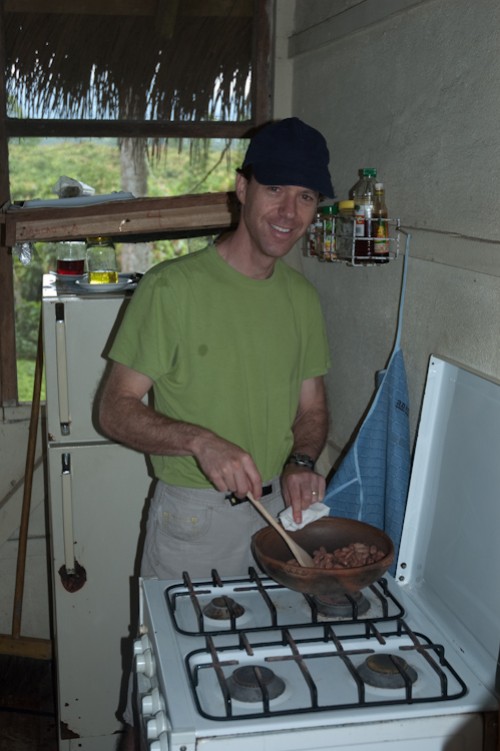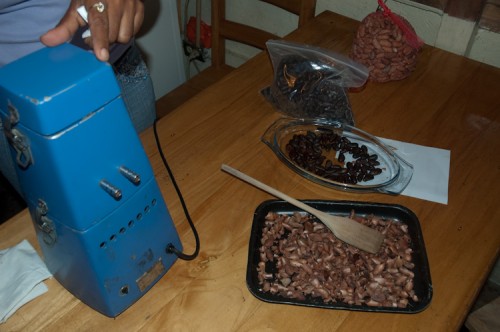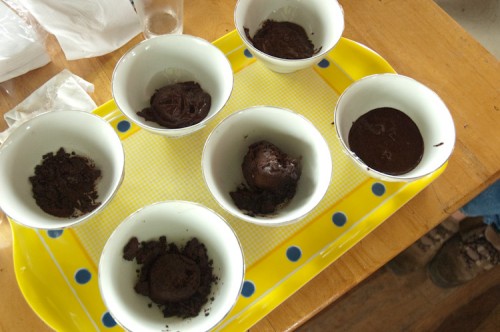Interview with Jeffrey Stern, Chocolatier and Chocolate Advocate in Quito, Ecuador, final
Jeffrey Stern is a chocolatier, chocolate advocate, entrepreneur, and blogger based in Quito, Ecuador. I recently asked Jeff to answer a long list of questions about his life and work, and he was kind enough to oblige. The first and second parts of the interview can be read here and here. Below, in the third part of the interview, Jeff shares some final thoughts on the role of chocolate in his life, working with chocolate, learning more about it, and starting a chocolate business in a cacao growing country.
Interview with Jeffrey Stern, Part 3, November 2011
Carla Martin (CDM): What are some of your most memorable experiences related to chocolate?
Jeffrey Stern (JM): I don´t have any really strong childhood memories of chocolate — I did always like to cook, but didn´t really figure that out until I was in my late twenties. I was just the regular American kid who grew up eating Hershey bars, Reese´s Peanut Butter Cups, Snickers, and Milky Way. I always had an affinity for chocolate but not an obsession.
Once I finished culinary school and started playing around with chocolate, I saw that there was so much more I could do with it. Another turning point for me was the day when I realized I could almost just look at chocolate and see if it was properly tempered/crystallized. Having that familiarity from working with it day in/day out, when you can temper on-call with no thermometer, no guidance, no reference points except what’s in your own mind, that’s a nice achievement. Once you have that, you can do a whole lot more because you don’t have to doubt if it’s properly tempered, you don’t have to check, you can just start making stuff. Then from there, once you realize how crystallization also applies to ganaches, things just get a lot easier to make.
I think my most memorable experience was tasting cacao liquors on the farm a few years ago, here in Ecuador. I had no idea there were such major distinctions between different beans based on fermentation alone. All the bean batches had been unscientifically roasted in a traditional clay pot, then ground there on the spot in a lab grinder for us to taste. Photos below.
CDM: What are your favorite things about working with chocolate?
JS: I like working with chocolate because it demands patience, you can’t rush it, and you have to pay attention to what you’re doing. My favorite activity in the shop and the one I find the most “zen” is running the enrober. You get the chocolate in temper, tweak all the adjustments on the enrober, and then just start running pieces through it. They come off, you apply transfers or fork designs or toppings, and then you just do it again. With my employee in the shop, we can get into a groove where no one is talking, we are just running batch after batch of pieces through the machine, and these beautiful little gems are being produced one after another after another. And suddenly an hour has passed and there are tables full of chocolate everywhere, and you line them up on a sheet pan and into the speed rack and just keep going.
CDM: What role does chocolate play in your life outside of work? (e.g. How is chocolate valued in your life or adding value to your life? What about it is rewarding? Is it a part of your family life?)
JS: I would say now that I have been so involved in chocolate here for so much time, chocolate and work have meshed as one. Through blogging about chocolate and my web presence, I am getting an increasing number of tourists from abroad coming to visit the workshop, as well as tour operators contacting me for activities. I always have chocolate around at home, but usually just solid bars or mendiants with dried fruits and nuts. My kids love all things chocolate, and fortunately they prefer dark over milk! I have also taken the kids to cacao plantations with me, and to them, it´s not some mystery or something strange where chocolate comes from. It´s very commonplace for them.
CDM: What would you recommend that folks new to exploring fine or craft chocolate do to learn more?
JS: Besides tasting as many different chocolates as possible, I would recommend trying to visit a cacao growing country. Don’t just go to the country and visit a cooperative or grower, but stay a few days on the ground, see what goes on, talk to the farmers. Visit chocolate factories, chocolate makers. Get immersed. That’s what I try to offer people who come on tours to Ecuador — to not just taste chocolate, but get a real taste for the people, country, and heritage behind chocolate in the country of origin.
CDM: If other groups of people were interested in forming companies similar to yours, what advice would you offer to them?
JS: The operations and logistics are easy; anyone can learn how to do those parts and while there is not a lot of guidance out there, it’s not difficult. But if you plan to set up a business in a cacao producing country, you’ll probably find that most people in the country are not that interested in chocolate itself — because most of it, in the form of beans, is being exported. That’s just a fact of the developing world and commodities-based economies. There is a deep, difficult chasm to cross if you want to export chocolate from say Ecuador, to the US, and not have it be perceived as just another consumer packaged good in the US. You need to do more than tell a good story, you need a strong physical presence with a location, props, and someone who knows about, and cares about, the story. You have to be willing to agonize over every piece, bar, item you make — you just have to love what you do or else it will be difficult to find the persistence and tenacity to keep doing it until you can make money at it.
——————————————————————————————————————————–
Visit Jeffrey Stern’s blog here to learn more about his adventures with chocolate just south of the equator, and follow his company Gianduja Chocolate on his website and on Facebook. Please also consider supporting Jeff’s ongoing Kickstarter campaign — an innovative direct trade project to promote Ecuador’s heritage Nacional cacao and benefit small farmers.
comments
Leave a Reply




